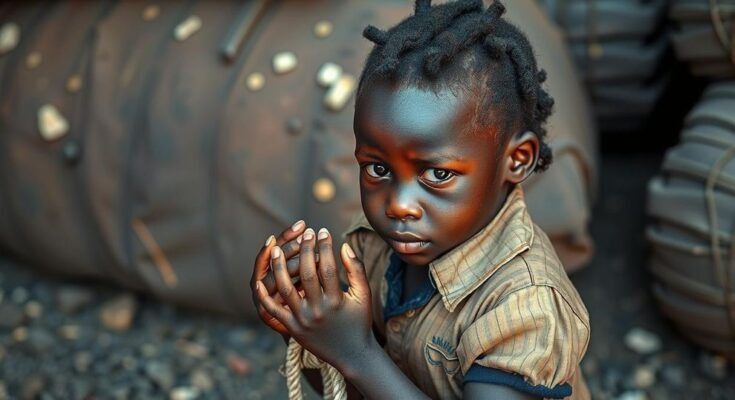The ILO has launched the GALAB Project to combat child labour in cobalt mining in the DRC, funded by the U.S. Department of Labor. This initiative builds on previous efforts and aims to provide remediation services through the CLMRS. It promotes collaboration among stakeholders, enhances training for labour inspectors, and establishes public-private partnerships to foster ethical mining practices. Key goals include educational support for affected children and a reduction in child labour practices in the sector.
The International Labour Organization (ILO) has launched the GALAB Project in the Democratic Republic of the Congo (DRC) to combat child labour in the artisanal cobalt mining sector. This initiative, funded by the U.S. Department of Labor, builds upon prior efforts to eliminate child labour and aims to strengthen the Child Labor Monitoring and Remediation System (CLMRS) while enhancing collaboration among various stakeholders. Amidst the DRC being the largest global supplier of cobalt, the project seeks to address ongoing challenges involving child labour and promote safe and ethical practices within the mining sector.
The GALAB Project aims to bolster the Congolese government’s capacity to eliminate child labour, targeting a vision of “zero children in the mining sector.” Drawing from the results of the previous COTECCO Project, it will introduce comprehensive child protection measures and promote accountability within supply chains. The initiative will implement referral and remediation services for identified child labourers, with an emphasis on education, vocational training, and income-generation support for families.
Partnerships with organizations such as UNICEF and the PABEA-Cobalt initiative will facilitate access to essential resources for the children documented in the CLMRS. The project also spends significant effort on enhancing the training of labour inspectors to improve monitoring systems across the sector, ensuring a collaborative approach in enforcing ethical mining practices.
The GALAB Project underscores the importance of public-private partnerships aimed at eliminating child labour. By providing training to private sector actors on national and international legal standards, it promotes responsible business practices within cobalt mining. The project anticipates enhancing accountability and collaboration among stakeholders, leading to a significant decrease in child labour practices and an improvement in the rights of workers.
Nteba Soumano, ILO Country Director for Angola, Congo, Gabon, Central African Republic, DRC, and Chad, emphasized, “The GALAB project is a crucial step forward in our collective efforts to combat child labour in the DRC’s cobalt supply chain,” highlighting the project’s potential to effect real change for affected children and their families.
Overall, the GALAB Project represents a fundamental commitment to safeguarding children’s rights and addressing systemic challenges within the cobalt mining sector of the DRC. It aims to ensure that as cobalt continues to be a critical mineral for various technologies, the associated human rights issues are comprehensively addressed and resolved.
The launch of the GALAB Project addresses a pressing concern within the Democratic Republic of the Congo, a country that is a leading supplier of cobalt, essential for modern technologies including electric batteries and energy systems. Despite its significance, the cobalt mining sector faces severe allegations of child labour, particularly within artisanal and small-scale mining operations, where working conditions are often dangerous and violate fundamental human rights. Previous initiatives like COTECCO have initiated efforts to rectify these injustices, but further action is imperative to ensure accountability and promote safe working environments for children and miners alike.
The GALAB Project represents a pivotal move towards eliminating child labour in the cobalt mining sector of the DRC, focusing on remediation services and stakeholder cooperation. By implementing thorough systems for monitoring and remediation, alongside robust training for private sector actors, it seeks to foster responsible mining practices and uphold the rights of children. The anticipated outcomes promise to significantly advance accountability and ethical compliance in this critical supply chain, aiming for a future where children are protected, and their rights are respected.
Original Source: www.ilo.org




